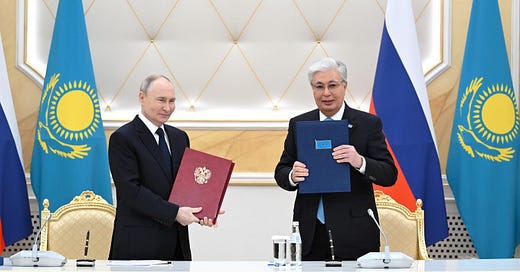Central Asia's week that was #32
Putin gets red carpet in Astana, assassination attempts and plots, Turkmen activist blocked. Also, Kazakhstan sticks to guns on time, vaping ban, and Turkmen leader writes another book.
So this happened…
Russian President Vladimir Putin embarked on a two-day state visit to Kazakhstan, where he was received with considerable pomp by his counterpart Kassym-Jomart Tokayev. Following lengthy bilateral talks — reportedly lasting around two hours — the two leaders spoke of the longstanding alliance between their na…
Keep reading with a 7-day free trial
Subscribe to Havli - A Central Asia Substack to keep reading this post and get 7 days of free access to the full post archives.





